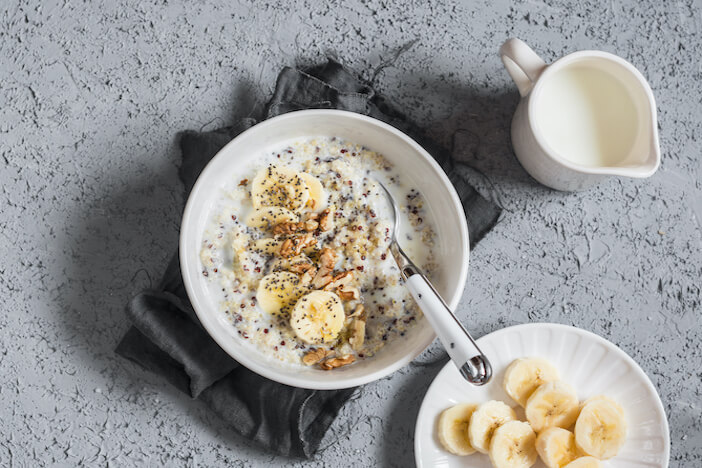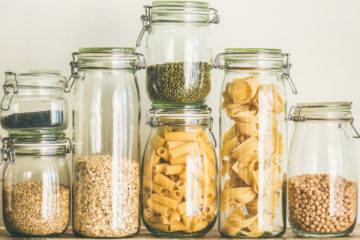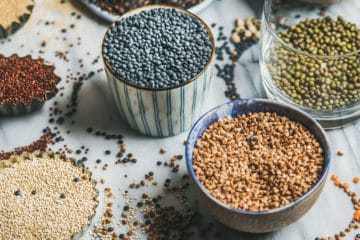Flaxseed – A superfood that supports weight loss?

Flax seeds (or linseeds) have emerged as a new superfood in recent times. However, our ancestors used them medicinally long ago and now the hype is flourishing again. With a portion of just a few grams, flax seeds promise weight loss and many health benefits.
But how reliable is this promise? What exactly are flax seeds and how can they help us?
In this article we will answer these two questions and teach you all about flaxseed!
What are flax seeds and what are they made of?

Flax seeds are the seeds of flax, also known as common flax, which is one of the oldest cultivated plants worldwide. This superfood is grown mainly in Ukraine, Russia and China.
The nutritious shell of the seed contains many mucous substances. These consist of xylose and galactose. In addition, the seeds contain vital omega-3 fatty acids, which the body can’t produce by itself.
The seeds consist of about 30 % fibre, 25 % protein and 30 – 45 % oil.
Comparing flaxseeds and chia seeds: nutritional value, calories and nutrients
| Nutrients | Flaxseed per 100g | Chia seeds per 100g |
|---|---|---|
| Calories (kcal) | 473 | 459 |
| Protein | 28.8 g | 22 g |
| Carbohydrates | 0 g | 3.5 g |
| Fat | 30.9 g | 33 g |
| Omega-3 fatty acids | 16.7 g | 21 g |
| Fibre | 38.6 g | 33 g |
Where does the flaxseed trend come from and what is it based on?

Today, flax seeds are heralded as a superfood. They are indeed characterised by a high content of valuable nutrients and should be found in every trendy kitchen. The valuable nutrients of flax seeds make them a high-quality and sought-after food.
The seeds have been considered a natural medicinal plant for many years, but were also an important textile raw material until the 18th century.
5 reasons to eat flaxseed daily
- They support digestion: flaxseed contain swelling substances, which expand in the stomach and intestines when they come into contact with liquids. The increased volume increases pressure in the intestine and thus promotes digestion. In addition, they boost our feeling of being full.
- They protect the mucous membrane: the mucilages they contain protect the mucous membrane in the stomach and intestines and thus prevent inflammation. In particular, flaxseed can prevent inflammation of the gastric mucosa.
- They lower blood pressure: the omega-3 fatty acids in the seeds can lower blood pressure and promote a healthy heart.
- They cleanse the skin: the superfood can balance our hormones and consequently promotes a clear complexion.
- They contain vitamins: flax seeds provide the body with important vitamins. Among others, vitamin B1, B2, B6 and E can be found in flax seeds.
Are flax seeds good for weight loss?
Flax seeds can help you reduce your weight. The fibre they contain means that they take up a lot of room in the stomach, as their swelling substances bind water and swell up. This results in a more intense feeling of satiety.
In addition, they can prevent food cravings because our blood sugar level rises slowly after we ingest them. In addition, the high protein content contributes to the maintenance of muscle mass and also to the feeling of satiety.
The seeds are therefore well suited for weight loss in combination with a balanced diet and sufficient exercise.
The right way to eat flaxseed

Flax seeds can become intolerable to the body if too many are consumed, in which case they have a laxative effect. Therefore, it’s really important that you take flax seeds properly. There are also other points to consider.
- Dosage: the maximum daily amount of flaxseed you should eat is 45 grams. This means, for example, you can consume 15 g three times a day.
- Taking with medication: flax seeds can delay the absorption of medicines in the gastrointestinal tract. Therefore, they should be eaten half an hour to an hour before or after taking a dose of medicine.
- Sufficient water intake: since flax seeds bind a lot of water, it is important to drink enough. The recommendation is at least 2 litres per day.
- Health complaints: if you are not feeling well and have some sort of gastrointestinal ailment or disease, you should stop eating flaxseed and consult a doctor.
What types of flaxseed are there?
| Type | Tips for use |
|---|---|
| Shredded | Suitable for breakfast: muesli, smoothie, porridge |
| Soaked in cold water | Let the seeds swell in cold water for about 30 minutes; drain the liquid and enjoy the resulting pudding |
| Soaked in hot water | Soak the seeds in hot water until all the liquid has been absorbed |
| Milled | The resulting flaxseed flour is a great substitute for conventional wheat flour |
| Pressed | The resulting flaxseed oil is a great substitute for conventional olive or sunflower oil; however, it can’t be heated – only used for cold dishes |
Unfortunately, crushed and soaked flax seeds also have disadvantages. The fat that escapes during the crushing process quickly becomes rancid. You should also avoid soaked flaxseed when treating constipation. The absorption of water and the increase in the volume of seeds should occur in the intestine if you want to relieve constipation. This exerts a targeted stretching stimulus on the intestinal wall.
Tip: Eating the whole seeds is the most nutritious option.
Conclusion

Flax seeds are a true superfood due to their valuable and useful nutrients. In addition to their health benefits, flax seeds can help you lose weight. If you consume the seeds correctly, their effect sets in after 12 to 24 hours and reaches its peak after two to three days.
Frequently Asked Questions
How many flax seeds can you eat per day?
The recommended amount is a maximum of 45 g (5-6 tablespoons) per day. To prevent blockages, you must also drink sufficient water. At least 2 litres are recommended.
Is it possible to lose weight with flaxseed?
Flax seeds are a very valuable tool in weight loss. Their high fibre content ensures a long-lasting feeling of satiety. In addition, they prevent food cravings, as they only increase the blood sugar level very slowly.
What are the benefits of flaxseed?
Flax seeds support health in many ways. In particular, they promote good digestion by stimulating the intestines due to their fibre and swelling substances.
How quickly can I notice the effects of flaxseed?
Their effects set in after about 12 to 24 hours and reach a maximum after two to three days. However, this only happens if sufficient liquid is also consumed so that the flax seeds can absorb it and swell up.
Sources
- Goyal, A., et al. (2014). ‘Flax and flaxseed oil: An ancient medicine & modern functional food‘ in J Food Sci Technol, 51(9). Retrieved on 30.03.2023.
- Parikh, M., Maddaford, T. G., Austria, J. A., Aliani, M., Netticadan, T., & Pierce, G. N. (2019). ‘Dietary Flaxseed as a Strategy for Improving Human Health‘ in Nutrients, 11(5). Retrieved on 30.03.2023.




